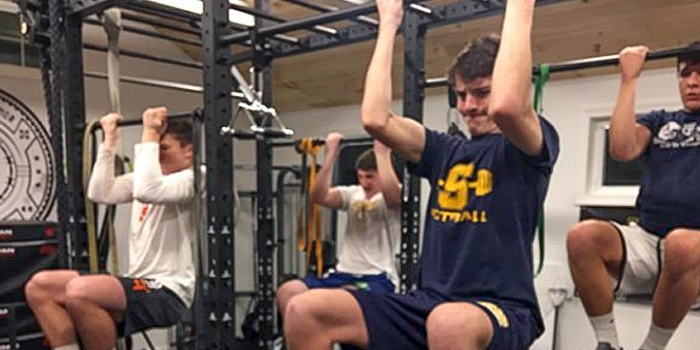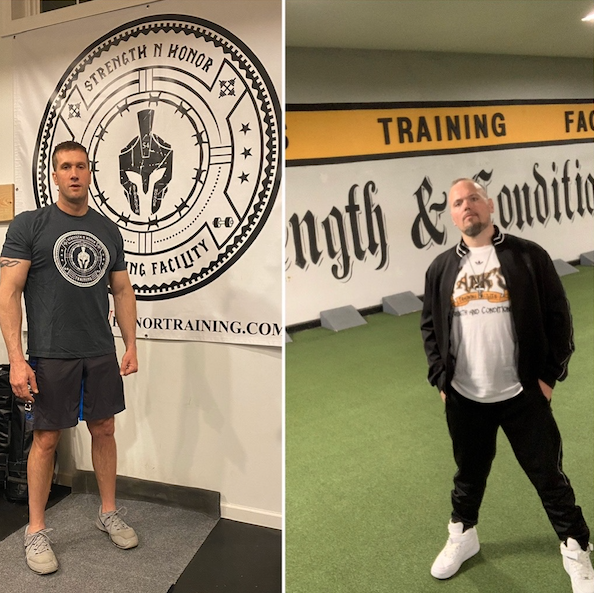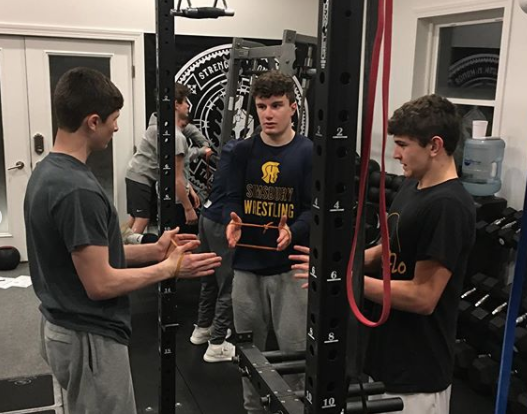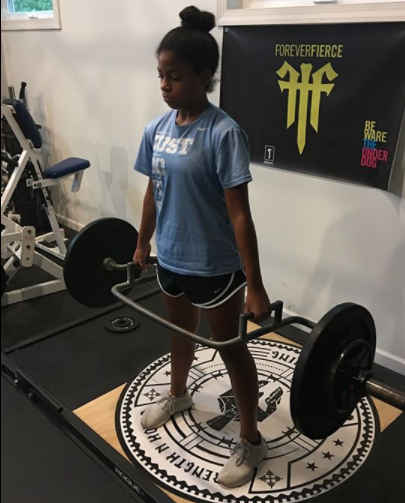
We all know the benefits of a good quality strength and conditioning program. Almost every high school has some sort of program for their athletes to follow that aims to gain an 'edge' over opponents. With so many methods to choose from, is your school's team-training hurting or helping your athlete?
INTERVIEW: Stewart-Haas Racing Athletic Director Greg Honeychuck
Today I sit down and talk with Steve Konopka to help answer this question. Co-author of #BAMFW, Steve is the owner and head strength coach at Strength N Honor Training Facility, a small private training studio hidden in Simsbury, Connecticut. Here he specializes in elite athletic performance and injury- resistance training. Steve played division 1-AA football at Central Connecticut State University while pursuing a degree in exercise science. He went on to gain NFL experience with the New York Giants and then had an eight-year-long career in the Arena Football League. Steve is the summer performance coach for Granby High School football team and recently added his training philosophies and expertise to Ascension Athletics in Bristol, Connecticut—one of the premier MMA/wrestling gyms in New England.

What are your thoughts on the strength and conditioning coaching from the high school level in your area?
CHRIS: I don't know of any in my area. Most high schools have a head coach or assistant devising some form of weight training where they run athletes into the ground. I have been very blunt with my local high school teams that they do too much instead of focusing on their job. It would be equivalent to me teaching my soccer athletes how to do soccer touches or how to run an offense. I would never go outside my scope of practice. The same thing applies to life. I can watch a YouTube video on how to drywall tape and sand, but it won't look or be as good as a professional.
KONO: It's a little bit of both up here. A few of the bigger schools in town have the means financially or the desire to fundraise because they know the importance of a designated strength coach. But for the most part, it's an assistant coach that knows just enough from his playing days or does the old cut-copy-and-paste workout from somewhere. There are a few schools around here that have some knowledgeable strength coaches, which seems weird for how non-important sports are to most people in my state compared to the rest of the country. Some are private schools, but there is a powerhouse that runs a great program for youth sports that transitions to high school. That combo of great youth programs and a good system has made them a perennial powerhouse and tough to beat. Yet my local Trojans are gaining fast with the systems and coaches the school has set in place (sorry, cheap home-town plug).
I think if schools would just hire or consult with a good strength coach to design and implement a solid program for the year, it could do wonders for these young athletes. Have the strength coach come in with a program and meet with each team that wants to use it. The strength coach could meet with whichever coach that would be in charge of implementing the program with the athletes so the coach would be comfortable with the process. It would not be as beneficial as having the right coach on hand with the athletes two to four days a week, but in my opinion, it could increase performance and drastically reduce some injuries.

Do you have any issues with teams wanting their athletes at mandatory lifts, but the athletes want to train with you?
CHRIS: I always ask the athlete what they do with their team, organization, or anything outside of my facility. I always want to compliment what they do so we don't overwork or overtrain them. I have not had many issues with this. Most are upfront with me. I do think it is important for them to attend and have mandatory team sessions for camaraderie. Again I always check in with the athlete to see what we can accomplish for the week.
KONO: This is a tough one I run into quite a bit. The surrounding towns where the majority of my athletes go to school have a strength coach, so the bigger sports, especially football, have mandatory lifting. I think it is important for team building to be there 100 percent, so once that schedule is set for them, I adjust mine around it to make sure the athletes are getting what they need across the board.
Have you had bad blowback from strength coaches being insecure or closed-minded, or do you get coaches saying, "Hey, let's work together and get the best for these athletes?"
CHRIS: I have had a couple of coaches in the area contact me with some input. I have taken some of it to heart, and some goes in one ear and out the other. Most want my input—a sign that the coach wants the best for the team. Working together helps everyone.
When the coach starts off with questions to see what we are doing, I am more impressed by that than a coach who starts by telling me that this is their team, and they cannot train at my facility.
I have never asked any coach for publicity or a thank you for improving their athletes. There have been some awesome coaches in my area who talk-the-talk and walk-the-walk.
Some of the area coaches will train right alongside their athletes, and this sets a GREAT EXAMPLE!
KONO: Yeah, this has gone both ways for me as well. Most of the coaches are totally down with it, realizing it's only a small percentage of the athletes getting extra work in. They know I'm in it for the best of the athlete and I'm not some local global gym trainer trying to play the role. I have kids traveling up to 45 minutes, so there are a few different strength coaches that cross paths with me.
The actual sports team coaches are always happy. I hear, "Keep it up we love it!" all of the time. Sometimes I hear school strength coaches say my success with my athletes is because I get to handpick the athletes I train, or it's easier with small private groups. I can't deny that being in a small private studio allows me to be able to provide personal attention to every rep and set. But for a broad program, some of these school strength coaches are doing a good job with the teams. I might do a few things differently, but overall it's great that these athletes have access to a designated strength coach. I never pay attention to any of that negative stuff because everyone else's job always looks easy until you have to do it yourself. As long as I don't see any of my athletes getting hurt by doing anything dumb, I stick to my responsibility of over-delivering to them.
A parent and a high school strength coach (assistant coach who is a carpenter by trait) once asked why their child would need to train with me as well. My answer was, "Your child has a math teacher, and that math teacher teaches a great curriculum, but your son or daughter is behind a bit. Would you send them to a tutor? The same child has a C but has finals in two months, and a big final score could boost their grade to a B. Would you get them a tutor? Your child has an A in class and wants to jump up to the AP level math class because they love it! Your son or daughter tries hard without you ever having to remind them to study extra. The child tells you he or she wants to get into AP math and asks to get a tutor to help. What do you say?" I saw the light bulbs turn on. It was awesome!
I think of myself as a strength sports tutor for athletes that already have a designated strength coach at their school. Because the curriculum or strength program can be great, some athletes need help catching up, some need extra work to reach their potential, and some savages are chasing titles and dreams and will work their butts off any way they can to reach them.

What are some of the ways you ensure the athletes aren't overtraining?
CHRIS: We have been stressing to eat properly and stay hydrated since day 1. We also push ice therapy, massage therapy, stretching, and body tempering to all athletes.
Along with those recovery methods, we always get a general sense of their body language. This can go far. Being observant lets me notice if the athletes are overtraining.
SLEEP is probably the most important, IMO. Stressing to the athletes they get as much sleep as possible (with everything shut off and unwired), is key. I will always ask if the athlete is lifting at another location, like their high school, club, or select team. I never want them to do double work.
I work around what they have done so we can maximize what we are trying to accomplish. Knowledge and sharing information is the key to accomplishing the end result of athletic improvement.
KONO: Constant communication with them from the second they walk through the door. Body language is key, as well. I am fortunate to only pick athletes that want to be in my studio training, not because a sports coach mandates it. So when they don't look eager to bend some freakin bars, I start asking questions. "What did you train yesterday or today? What was breakfast like? How did you sleep last night?" I keep an eye on them during active warm-up and pre-hab training before we hit our main lifts.
Suppose someone is overly sore or tired. We auto-regulate to give them what they need. For instance, if an athlete just squatted heavy on Monday at school and we have a max effort squat day scheduled for Tuesday, a workload like that is how an athlete can get hurt. So, we have to adjust the workout to get that athlete exactly what they need—simply changing the means of resistance, sets and reps, or taking out an exercise completely. I will always ask if the athlete is lifting at another location (at high school, a club, or select team) because I never want them to do double work. I work around what they have done so we can maximize what we are trying to accomplish.
Are there some checks and balances you routinely use for the athletes?
CHRIS: Checking in with the athlete is a must. The successful athlete is working properly on and off of the training session.
I am always asking if they got the proper amount of sleep, if they ate breakfast (including what they ate and drank), what their weight is, what their soreness level is, and how their general overall feeling is. These are the daily things I try to do.
I speak with the athlete or group prior to workouts. This helps them understand and follow the game plan for the day, and it informs them of what we are trying to accomplish. Along with that, after the workout, it makes sure they are recovering properly (stretch, diet, rest, hydrate, etc.) so they can come in for the next session healthy and prepared.
KONO: The main thing like I said before is communication and auto-regulating. Everything we do is recorded, so I always go through the reps and sets performed and see where the athlete is gaining or not gaining the way I expect. Another thing we do is fill out meal charts for three days. They fill out charts for everything they eat and drink, including supplements they take. I am a HUGE believer in post-workout shakes for recovery and gains. I always have used them, and when I didn't, I could feel and see the difference. My charts also have a sleep number as well, so we get a good snapshot and try to get the athlete to be more compliant. I always say there is no such thing as a two-hour-a-day champion! To be great, it's 24-7-365!
This past year we started implementing the Braverman Test, too. The Braverman Test is a personality test to see what type of coaching athletes respond to mentally. Therefore, I'll know what coaching cues stimulate Johnny best to get through a tough workout or plateau the first coaching session instead of wasting a week (or longer) through trial and error.











1 Comment